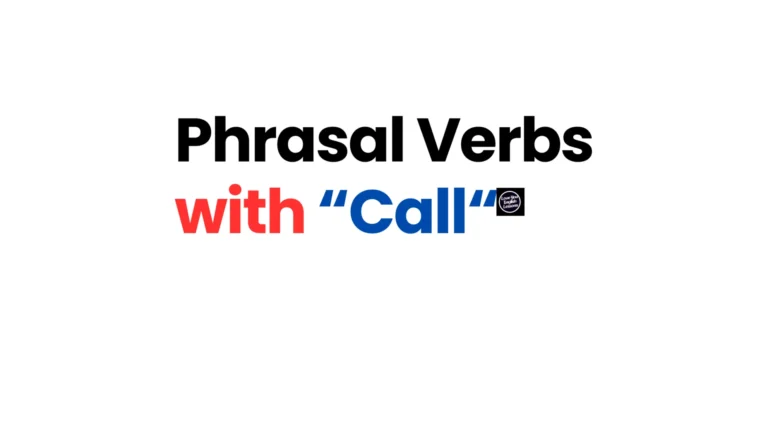Phrasal Verbs: Common Examples & Their Meanings
In this blog, I am going to be teaching you different phrasal verbs. Now, phrasal verbs are challenging for a couple of different reasons.
First, it’s usually that preposition that follows the verb that can confuse people and trip them up from time to time.
They’re also challenging because phrasal verbs can have more than one meaning.
But what I want to do, we found that the best way to teach phrasal verbs is to learn phrasal verbs related to a topic.
I’m going to teach you phrasal verb that are related to work or school.
I’m going to tell you the phrasal verb. I’ll give you the meaning, as well as some example sentences,.
Also read:
- What Are 5 Tips For Reading The News In English?
- How to use an English dictionary to learn English
- How to Balance Work and Personal Life – A Guide
Are you ready?
Hand in
“Hand in” is a phrase we use when we’re talking about giving something to someone or submitting something for a specific purpose. It’s like handing over or turning in something you’ve finished or completed.
So, when do you use “hand in”? Well, you can use it in different situations:
School or Work: You might hear this phrase a lot in school or at work.
For example, when your teacher asks you to hand in your homework by Friday, it means you need to give them your completed homework assignment.
Or, at work, your boss might ask you to hand in a report by the end of the day, meaning you need to submit the finished report to them.
Forms or Documents: You can also use “hand in” when talking about giving someone forms or documents.
For instance, if you’re applying for a job, you might need to hand in your resume and cover letter to the hiring manager. Or if you’re renewing your driver’s license, you might have to hand in some paperwork at the DMV.
Return Something: Sometimes, “hand in” can mean returning something to its rightful owner.
For example, if you borrow a book from a friend, you’ll need to hand it back to them when you’re done reading it.
So, the next time someone asks you to “hand in” something, whether it’s your homework, a form, or even just borrowing something, it means they want you to give it to them. It’s as simple as that!
Hand out
“Hand out” is a phrase we use when we’re giving something to a group of people. It’s like distributing or passing out something to others.
Here are some situations where you might use “hand out”:
Classroom: If you’re a teacher, you might use “hand out” when you’re giving worksheets, assignments, or materials to your students.
For example, you might say, “I’ll hand out the homework assignment now,” meaning you’re going to give each student a copy of the assignment.
Events: If you’re organizing an event like a conference or a seminar, you might use “hand out” when you’re distributing programs, brochures, or other informational materials to the attendees. You could say, “Volunteers will hand out the programs as you enter the auditorium.”
Charity: If you’re involved in a charity or volunteer organization, you might use “hand out” when you’re giving out food, clothing, or other necessities to people in need.
For example, you might say, “We’ll hand out sandwiches and water to the homeless in the park.”
Meetings: In a business setting, you might use “hand out” when you’re distributing documents or reports to your colleagues during a meeting. You could say, “I’ll hand out copies of the agenda before we start.”
So, whenever you’re giving something to a group of people, whether it’s in a classroom, at an event, for charity, or in a meeting, you can use “hand out.” It’s a simple way to let others know that you’re distributing something to them.
Look through
Look over
“Look over” is a phrase we use when we’re examining something quickly or casually. It’s like taking a brief look at something to get a general idea or to check for any obvious issues.
Here are some situations where you might use “look over”:
Reviewing: If you’re quickly reviewing a document, report, or assignment to get a sense of what it’s about or to check for any major mistakes, you might use “look over.”
For example, if your friend asks you to look over their presentation slides before a meeting, you might say, “Sure, I’ll look over them and let you know if I notice anything.”
Checking: When you’re quickly checking something to make sure everything is in order or to see if there are any problems, you might use “look over.”
For instance, if you’re getting ready to leave the house and you want to make sure you have everything you need, you might say, “I need to look over my checklist before I go.”
Scanning: If you’re scanning a document or webpage quickly to find specific information or to see what it’s about, you might use “look over.”
For example, if you’re browsing a menu at a restaurant, you might say, “Let me just look over the menu real quick before I decide what to order.”
Inspecting: When you’re examining something briefly to see if it meets your needs or expectations, you might use “look over.”
For instance, if you’re considering buying a used book, you might say, “I want to look over the book to see if it’s in good condition before I purchase it.”
So, whenever you’re examining something quickly or casually, whether it’s a document, a checklist, a menu, or an item you’re considering purchasing, you can use “look over.”
It’s a convenient phrase for describing a brief inspection or review of something.
Lay off
It’s a phrase we use when someone loses their job or when a company stops employing someone. It’s like when your boss says, ‘Sorry, we have to lay off some employees due to budget cuts.'”
Here are a few ways and situations you might use “lay off”:
Losing a Job: If your company is having financial problems or needs to cut costs, they might lay off some employees.
For example, they might say, “We’re sorry, but we have to lay off a few workers due to the economic downturn.”
Reducing Staff: When a company needs to downsize or restructure, they might lay off employees to reduce their workforce. You might hear, “The company is restructuring, so they’re laying off some employees from the marketing department.”
Temporary Suspension: Sometimes, “lay off” can also mean taking a break from something temporarily.
For instance, if you’re on a diet but decide to take a break from it for a week, you could say, “I’m going to lay off the diet for a little while and enjoy some pizza.”
Stop Doing Something: You can also use “lay off” to mean stopping doing something, especially if it’s excessive or harmful.
For example, if your friend drinks too much coffee, you might say, “You should lay off the caffeine before bed; it might affect your sleep.”
So, whenever you’re talking about someone losing their job, a company reducing its staff, taking a break from something, or stopping doing something, you can use “lay off.”
It’s a common phrase in conversations about employment and making changes in behavior.
Take on
Knock off
It’s a phrase we use in a couple of different ways, depending on the situation.
Finish Work: One way we use ‘knock off’ is when we finish work for the day. It’s like saying, ‘I’m done for the day.’
For example, if you’re leaving the office at the end of your shift, you might say, ‘Hey, I’m knocking off now. See you tomorrow!’
Imitate or Copy: Another way we use ‘knock off’ is when something is a copy of or imitates something else. It’s like a cheap version or a fake.
For example, if you see a purse that looks just like a designer one but is way cheaper, you might say, ‘That’s a knock-off of the real thing.’
So, you can use ‘knock off’ when you’re talking about finishing work or when something is a copy or imitation of something else. It’s a pretty casual phrase that comes in handy in everyday conversations.”
Burnout
“Okay, let’s talk about ‘burn out.’ It’s a phrase we use when someone feels really tired and exhausted from working too much or being stressed out for a long time.
Here’s how and when you might use ‘burn out’:
Feeling Exhausted: When you’ve been working super hard or dealing with a lot of stress for a long time, you might start to feel burned out. It’s like feeling completely drained and worn out.
For example, if you’ve been studying for exams non-stop for weeks, you might say, ‘I’m starting to feel burned out.’
Losing Interest: Burn out can also mean losing interest or motivation in something you used to enjoy. It’s like feeling totally fed up and not wanting to do it anymore.
For instance, if you used to love playing a certain video game but now you’re just not into it anymore because you’ve played it so much, you could say, ‘I think I’ve burned out on that game.’
Work Stress: Burn out often happens when people are under a lot of pressure at work. It’s like feeling overwhelmed and exhausted from the demands of your job.
For example, if you’ve been working long hours and dealing with a ton of deadlines, you might say, ‘I’m really feeling the burn out from work lately.’
So, whenever you’re feeling really tired and exhausted from working too much or being stressed out for a long time, you can use ‘burn out.’ It’s a pretty common phrase that people use to describe that feeling of being totally worn out.”
Work on
Go over
Agree on
‘Agree on’ is a phrase we use when two or more people come to a decision or reach a consensus about something together.
Here’s how and when you might use ‘agree on’:
Making Decisions: When you and someone else need to make a decision together, you’ll discuss the options until you both agree on the best choice.
For example, if you’re planning a road trip with your friends and trying to decide on a destination, you might say, ‘Let’s agree on a location everyone is happy with.’
Reaching Consensus: In group settings or discussions, people might have different opinions or ideas. ‘Agreeing on’ means finding common ground or reaching a consensus that everyone is okay with.
For instance, if you’re in a meeting at work and trying to decide on a project timeline, you might say, ‘We need to agree on deadlines that work for everyone.’
Negotiating: Sometimes, when you’re making deals or negotiating terms, you’ll need to come to an agreement with the other party. It’s like finding terms that both sides are satisfied with.
For example, if you’re buying a car and negotiating the price with the seller, you might say, ‘Let’s see if we can agree on a price that works for both of us.’
So, whenever you’re talking about making decisions, reaching consensus, or negotiating terms with someone else, you can use ‘agree on.’ It’s a handy phrase for finding common ground and making sure everyone is on the same page.”
Work through
Call off
‘Call off’ is a phrase we use when we cancel or stop something that was planned or scheduled.
Here’s how and when you might use ‘call off’:
Canceling Plans: If you have plans with someone but decide you can’t go through with them, you’ll ‘call off’ the plans. It’s like saying, ‘Sorry, we can’t do this anymore.’
For example, if you were going to have a picnic in the park but it starts raining, you might say, ‘Let’s call off the picnic and do something indoors instead.’
Ending an Event: Sometimes, events or gatherings need to be canceled for various reasons. If that happens, you’ll ‘call off’ the event.
For instance, if a concert can’t happen due to technical issues, the organizers might say, ‘We have to call off the concert.’
Stopping Something: ‘Calling off’ can also mean stopping something that’s already started.
For example, if two people are arguing and things start to get heated, a mediator might step in and say, ‘Let’s call off the argument before it gets worse.’
So, whenever you’re talking about canceling plans, ending an event, or stopping something from happening, you can use ‘call off.’ It’s a casual way to let people know that something isn’t going to happen as planned.”
Slack off
It’s a phrase we use when someone isn’t working as hard as they should be or when they’re being lazy instead of doing what they’re supposed to do.
Here’s how and when you might use ‘slack off’:
Not Working Hard: If someone isn’t putting in enough effort at work, school, or in any other task, you might say they’re ‘slacking off.’ It’s like not giving your best effort.
For example, if your friend is supposed to be studying for a test but keeps checking their phone instead, you could say, ‘Stop slacking off and focus on your studying.’
Procrastinating: ‘Slacking off’ can also mean delaying or putting off doing something you’re supposed to do. It’s like avoiding responsibilities.
For instance, if you have a project due tomorrow but you’re watching TV instead of working on it, someone might tell you, ‘Quit slacking off and get to work.’
Being Lazy: Sometimes, people just don’t feel like doing anything productive and would rather relax or do nothing. That’s also called ‘slacking off.’
For example, if it’s a beautiful day outside but your friend wants to stay inside and watch TV all day, you might say, ‘You’re such a slacker! Let’s go do something fun.’
So, whenever you’re talking about someone not working hard, procrastinating, or being lazy, you can use ‘slack off.’ It’s a casual way to call out someone’s lack of effort or motivation.”
Took off
‘Took off’ is a phrase we use when something becomes successful or starts happening quickly.
Here’s how and when you might use ‘took off’:
Success: If something becomes really popular or successful, you can say it ‘took off.’ It’s like saying it became a big hit.
For example, if a new song becomes really popular and starts getting played on the radio all the time, you might say, ‘That song really took off!’
Starting Quickly: ‘Took off’ can also mean something started happening really quickly. It’s like it got going without any delays.
For instance, if a rocket launches into space and speeds up quickly, you might say, ‘The rocket took off into the sky.’
Leaving Quickly: Sometimes, ‘took off’ can mean leaving a place quickly. It’s like getting out of there fast.
For example, if you’re at a party and your friend suddenly decides to leave, they might say, ‘I’m going to take off now.’
So, whenever you’re talking about something becoming successful, starting quickly, or leaving a place fast, you can use ‘took off.’ It’s a casual way to describe something that’s happening or happened in a hurry.”
Fill in
It’s a phrase we use when someone substitutes for someone else or provides information to complete something.
Here’s how and when you might use ‘fill in’:
Substituting for Someone: If someone can’t do their usual job or attend an event, someone else might ‘fill in’ for them. It’s like stepping in to take their place.
For example, if your friend can’t make it to a soccer game, you might say, ‘I’ll fill in for you and play on your team.’
Providing Information: When there’s missing information or details, you can ‘fill in’ the blanks. It’s like completing the missing parts.
For instance, if you’re filling out a form and there’s a section you missed, you might say, ‘I need to fill in this part.’
Completing Tasks: ‘Filling in’ can also mean completing tasks or finishing something that’s incomplete. It’s like doing the final steps.
For example, if you’re cooking and you need to add the final ingredients to a recipe, you might say, ‘I just need to fill in the last few steps, and then dinner will be ready.’
So, whenever you’re talking about someone substituting for someone else, providing missing information, or completing tasks, you can use ‘fill in.’ It’s a casual way to describe stepping in or completing something.”
Run in
It’s a phrase we use when someone starts doing new things or exploring different areas.
Here’s how and when you might use ‘branch out’:
Trying New Things: If someone wants to try new activities or hobbies, they can ‘branch out.’ It’s like spreading their interests to include different things.
For example, if someone who usually only plays sports decides to try painting, you could say, ‘They’re branching out and trying something creative.’
Exploring Different Areas: ‘Branching out’ can also mean exploring different areas or aspects of something. It’s like expanding your knowledge or experience.
For instance, if a company that sells only clothing decides to start selling accessories too, you might say, ‘They’re branching out and expanding their product line.’
Taking Risks: Sometimes, ‘branching out’ involves taking risks or trying something new and different. It’s like stepping out of your comfort zone.
For example, if someone who usually only listens to rock music starts listening to jazz, you could say, ‘They’re branching out and exploring different genres.’
So, whenever you’re talking about trying new things, exploring different areas, or taking risks, you can use ‘branch out.’ It’s a casual way to describe broadening your horizons and trying something new.”
Sort out
I’ve covered quite a few different phrasal verbs today.
Hopefully some of them you are already familiar with, and it was a bit of review for you. And I hope you learn some new phrasal verbs as well.
That’s it for today. But please feel free to look over these phrasal verbs one more time and keep reviewing them and examine them closely.
And that’s just going to help you work on building your vocabulary.
And that was a needless emphasis. But I just want to tell you that’s how common these phrasal verbs are.
We use them all the time. But I don’t want you to get burned out. Don’t get burned out. Keep working hard, but don’t get burned out.
Let me know your favorite ones.




